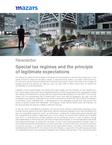
Special tax regimes and the principle of legitimate expectations
Likewise, if such need changes, the Government may modify such Tax Policies, or even repeal them, but it must respect those who have availed themselves of them, especially if their acceptance implied the making of investments to comply with the requirements demanded by the law itself. This not only arises from the seriousness that a Government must have with its taxpayers, but also from the constitutional principle of Legitimate Trust, which is derived from Article 83 of the Political Constitution of Colombia, which indicates that -in development of the postulate of good faith that governs the actions of public entities and individuals-, the taxpayer trusts that the Government will maintain, for the time granted, the special conditions offered in the law.
In the tax reform submitted to Congress, the Government intends to dismantle practically all the exempt income regimes and other special tax regimes and gives taxpayers who have benefited from them an inequitable treatment, which, as will be seen, violates the fundamental right to equality and the constitutional principle of legitimate trust. In such sense, the Government intends, as of taxable year 2017, to eliminate the exempt treatment on the following income; i) sale of electric energy generated based on wind resources, biomass and agricultural waste, ii) river transportation with boats and shallow draft boats, iii) ecotourism services, iv) use of new forest plantations of timber trees, v) new medicinal products and software, vi) seismic services, vii) seismic services, viii) seismic services, ix) seismic services, x, vi) seismic services for the hydrocarbon sector, vii) profit in the alienation of land destined to VIS and VIP, viii) income of the film industry, ix) provision of tourist housing services, x) exempted income of new companies located in San Andres, among others. Thus, the Government intends to maintain only certain exempt incomes such as those of the Andean Community of Nations -CAN- (which being a supranational provision cannot be modified by a local regulation), those coming from donations of foreign governments, financial yields of governmental entities of financial nature and cooperation of countries.
It is worth mentioning that the exempt income referred to above in paragraphs i) to v) are included in the repeals of the reform bill, however, by provision of article 96 of the bill, its current treatment will be in force until the taxable year 2017 (inclusive).
Only for certain exempt income and special regimes, the bill establishes a staggered plan of progressive dismantling for the time they have been granted. Such is the case of exempt income for hotel services, real estate leasing of housing, income from the use of new late yielding crops, income of publishing companies and income (not exempt but taxed at zero rate) of companies under Law 1429/2010. The above will be taxed at the rate of 9% (plus the corresponding surtaxes for the years 2017 and 2018) until the exemption or preferential treatment ends.
If the Government, for Fiscal Policy, wants to eliminate all exempt income and special taxation regimes, it must, for seriousness and to respect the right to equality and the principle of legitimate trust, propose a progressive dismantling plan for all those who have benefited from it and have made investments to access such benefits. Failure to do so may also engage the responsibility of the legislator for the commission of an unlawful act that violates the rights of taxpayers.


